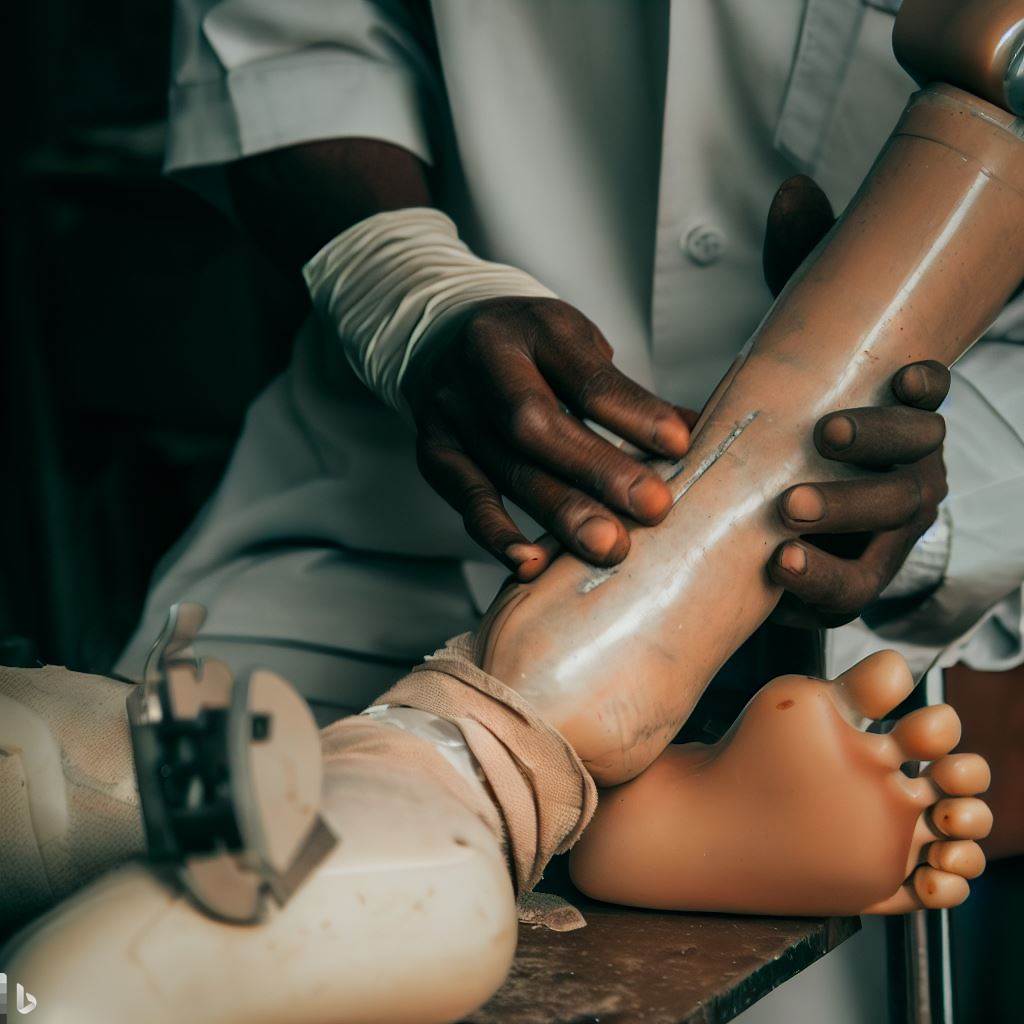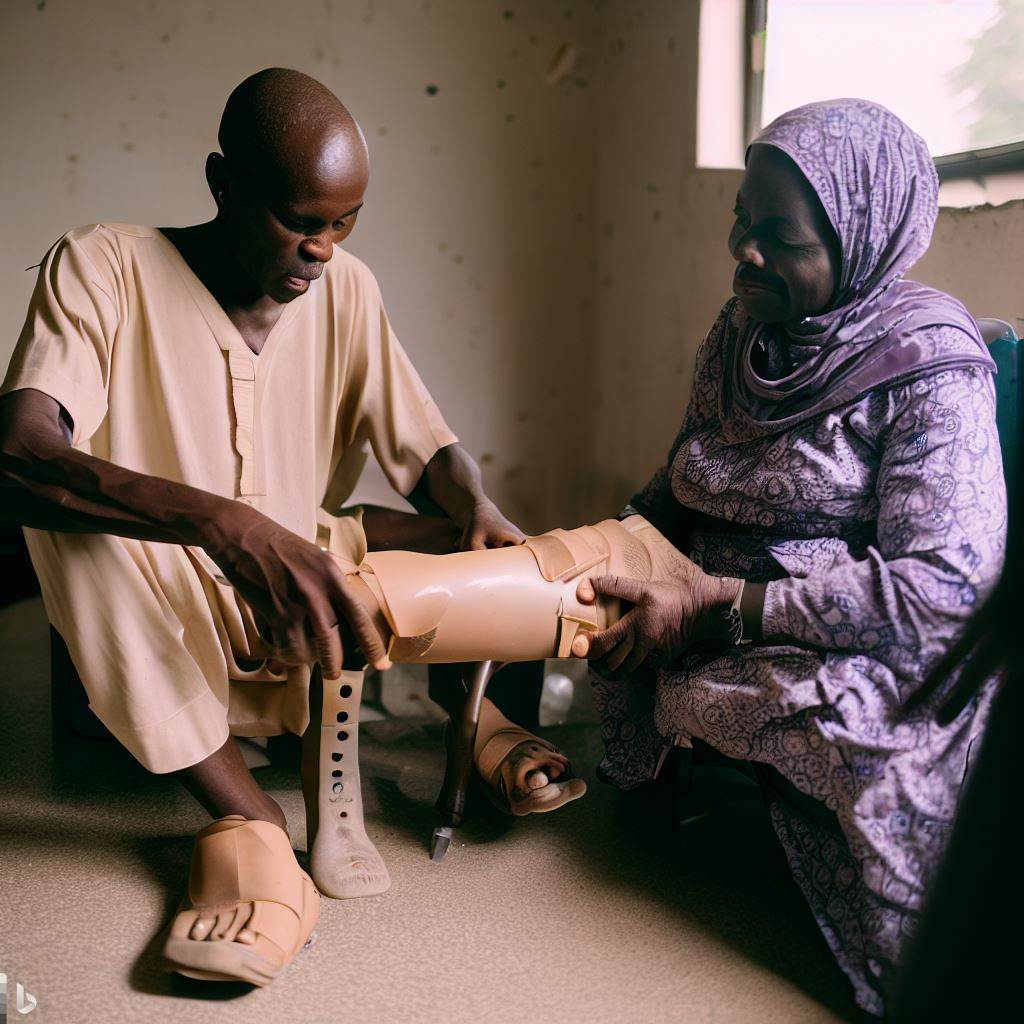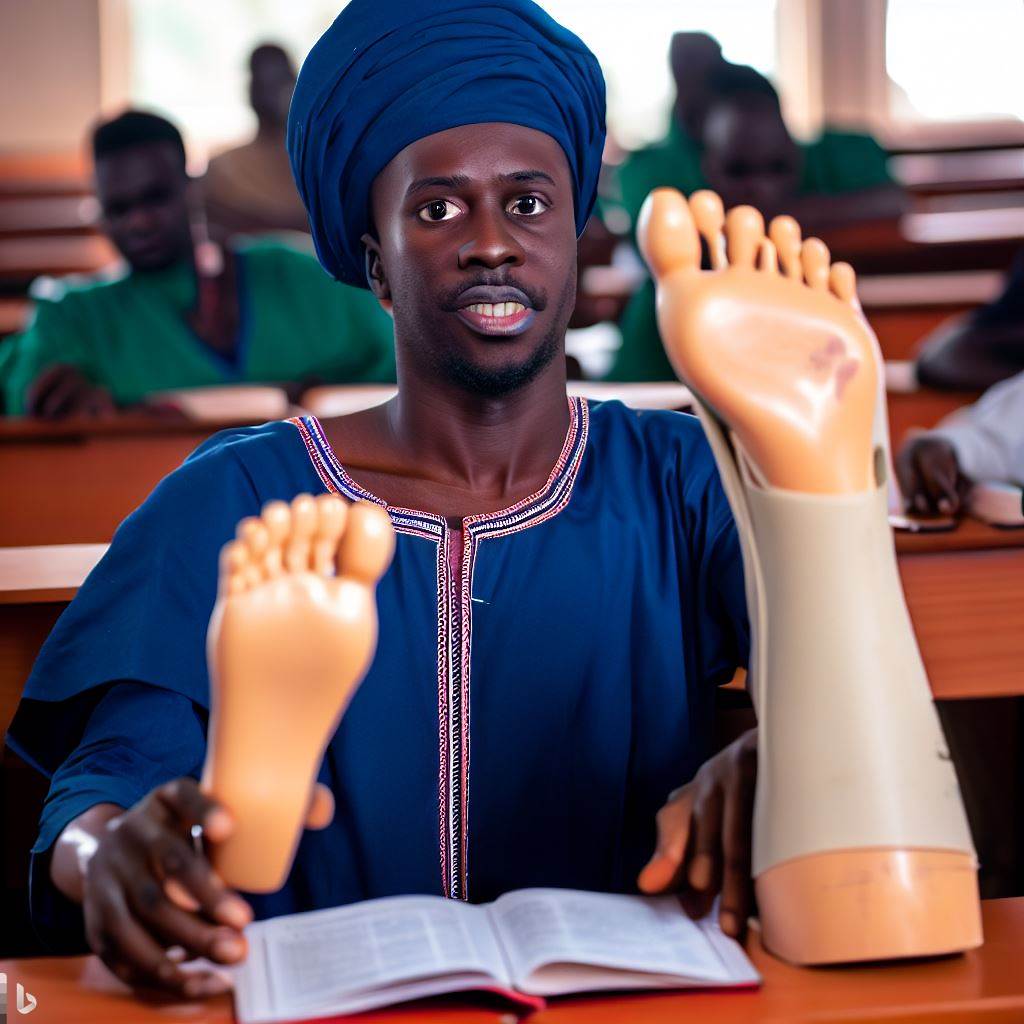Introduction to Regulations Governing Prosthetist Practice in Nigeria
Prosthetists play a crucial role in the healthcare system, providing vital services to individuals in need of prosthetic limbs.
Their expertise in designing, fitting, and maintaining these devices helps improve the mobility and overall quality of life for patients with limb loss or functional impairments.
The significance of regulations in prosthetist practice cannot be overstated, as they ensure the delivery of safe and high-quality services.
Regulations help maintain professional standards, uphold patient safety, and prevent the use of substandard materials or practices.
Specifically in Nigeria, the regulations governing prosthetist practice are designed to safeguard patient well-being and maintain a standard of excellence in the field.
These regulations outline the qualifications and certifications required for practicing prosthetists, guidelines for patient assessment and care, and standards for the fabrication and fitting of prosthetic devices.
Adhering to these regulations is vital in upholding the integrity of prosthetist practice and ensuring that individuals in Nigeria receive the best possible care, allowing them to lead more fulfilling lives with the support of well-designed and safe prosthetic devices.
Regulatory Bodies and Organizations
Explanation of relevant regulatory bodies responsible for overseeing prosthetist practice in Nigeria
In Nigeria, several regulatory bodies play a crucial role in overseeing and regulating prosthetist practice.
This section provides an explanation of these bodies and their responsibilities.
The Nigerian Medical Rehabilitation Therapists Board (NMRTB) is one of the key regulatory bodies responsible for monitoring and regulating prosthetist practice in the country.
It was established under the Medical Rehabilitation Therapists (Registration) Act of 1992, with the mandate to regulate and control the training, practice, and professional conduct of prosthetists in Nigeria.
Another regulatory body, the Medical and Dental Council of Nigeria (MDCN), also plays a vital role in overseeing prosthetist practice.
While the MDCN primarily focuses on the regulation of medical and dental professionals, its jurisdiction extends to prosthetists as well.
The MDCN ensures that prosthetists adhere to the highest professional standards, ethics, and guidelines.
The National Orthopaedic Hospital, Lagos (NOHL) is a renowned institution responsible for the provision of orthopedic services, including prosthetist practice.
It not only treats patients but also contributes to the regulation and advancement of prosthetics in Nigeria.
The hospital collaborates closely with regulatory bodies to ensure compliance with regulations and maintain quality standards.
In addition to these bodies, the Nigerian Society of Physiotherapy (NSP) also plays a significant role in the regulation of prosthetist practice.
While their primary focus is on physiotherapy, they work in collaboration with other regulatory bodies to shape regulations and ensure the highest level of professionalism and patient care in the field of prosthetics.
Introduction to their roles and responsibilities
The regulatory bodies mentioned earlier have distinct roles and responsibilities in ensuring the effective oversight of prosthetist practice in Nigeria.
Firstly, these bodies regulate the training and education of prosthetists, ensuring that approved programs and curricula meet the required standards.
They assess and accredit educational institutions to maintain the quality of prosthetist training in the country.
Secondly, licensing and registration are crucial components of the regulatory bodies’ responsibilities.
They establish criteria for licensing and monitor compliance to ensure only qualified individuals practice as prosthetists. This ensures the protection of public health and safety.
Professional standards and codes of conduct are also set by these regulatory bodies.
They establish guidelines that govern the ethical conduct, competence, and responsibilities of prosthetists.
These standards promote professionalism and protect patients’ rights and well-being.
Monitoring and enforcing compliance with regulations is an essential aspect of their roles.
Regulatory bodies conduct routine inspections, audits, and investigations to ensure prosthetists adhere to the established guidelines.
Violators may face penalties, such as fines or suspension of licenses, to maintain the integrity of the profession.
Moreover, these bodies are responsible for handling complaints against prosthetists. They investigate allegations of professional misconduct and, if necessary, take disciplinary actions.
This process ensures accountability and safeguards patients’ trust in the profession.
Lastly, regulatory bodies conduct continuing professional development programs to enhance the knowledge and skills of prosthetists.
These programs enable professionals to stay updated with technological advancements and new treatment approaches, leading to improved patient care.
Discussion of the collaboration between regulatory bodies and professional organizations in shaping regulations
The collaboration between regulatory bodies and professional organizations is vital in shaping regulations governing prosthetist practice in Nigeria.
Regular consultations between these entities allow for the exchange of ideas and perspectives, leading to more informed decisions.
The sharing of expertise and knowledge contributes to the formulation of regulations that reflect the current needs and best practices in prosthetics.
Joint efforts are made in establishing guidelines and standards.
Regulatory bodies and professional organizations work together to create comprehensive regulations that meet the diverse needs of the profession while prioritizing patient safety and well-being.
Furthermore, these entities collaborate in advocating for the rights and welfare of prosthetists and patients.
They jointly lobby for improved working conditions, fair compensation, and the recognition of prosthetists’ contributions to healthcare.
Collaborative efforts extend to organizing conferences, seminars, and workshops.
These events provide opportunities for prosthetists to enhance their skills, exchange knowledge, and stay updated with the latest advancements in the field.
They are often co-hosted by regulatory bodies and professional organizations to ensure comprehensive and relevant content.
Basically, the regulatory bodies, including the NMRTB, MDCN, NOHL, and NSP, play crucial roles in overseeing prosthetist practice in Nigeria.
Their role encompasses setting standards, enforcing regulations, and protecting patients’ interests.
Through collaboration with professional organizations, they work towards continuously improving the regulations and promoting professionalism in prosthetic practice.
Read: How to Become a Medical Lab Technician in Nigeria
Licensing and Certification Requirements for Prosthetists
Explanation of the different levels of licensure and certification for prosthetists in Nigeria
- Education and training requirements.
- Practical experience and competency assessments.
- Examinations and continuous professional development.
Importance of licensing and certification in ensuring the competence of prosthetists
In order to ensure the competence of prosthetists in Nigeria, licensing and certification processes are of utmost importance.
These processes set specific standards and requirements that professionals must meet in order to practice as prosthetists in the country.
By obtaining the required licenses and certifications, practitioners demonstrate their knowledge, skills, and competency in providing prosthetic care to patients.
Prosthetists are responsible for the design, fabrication, fitting, and maintenance of prosthetic devices.
They work closely with patients who have undergone amputations or who were born with limb deficiencies. The prosthetist’s role is crucial in helping patients regain mobility and improve their quality of life.
In Nigeria, licensing and certification requirements for prosthetists vary based on the level of education and training.
The highest level is the Certified Prosthetist (CP), followed by the Certified Prosthetic Technician (CPT) and the Prosthetic Assistant (PA).
Prosthetists must complete a specific educational program accredited by the regulatory body. Training programs focus on anatomy, physiology, biomechanics, material sciences, and prosthetic fabrication techniques.
Furthermore, practical experience and competency assessments are essential components of obtaining a license or certification.
Prosthetists must undergo clinical internships and training in approved facilities to gain hands-on experience in patient care and prosthetic device fabrication.
Examinations are conducted by the regulatory body to assess the knowledge and skills of aspiring prosthetists.
These examinations cover a wide range of topics, including anatomy, prosthetic design, biomechanics, and patient care.
Continuous professional development is also required to ensure that prosthetists update their knowledge and stay informed about advancements in the field.
Overview of the process for obtaining and renewing licenses and certifications
The process for obtaining a license or certification as a prosthetist in Nigeria involves several steps. Firstly, individuals must complete the required education and training programs.
Afterward, they need to pass the examinations conducted by the regulatory body.
Once the license or certification is obtained, it needs to be renewed periodically.
Renewal requirements often include demonstrating a specified number of continuing education credits, participation in professional development activities, and adhering to ethical standards set by the regulatory body.
Failure to meet the renewal requirements may result in the suspension or revocation of the license or certification.
The regulatory body closely monitors the professional conduct and clinical practice of prosthetists to ensure that they continue to meet the necessary standards of competency and ethical behavior.
In general, licensing and certification play a significant role in safeguarding the competence and quality of prosthetists in Nigeria.
By establishing specific education, training, and assessment requirements, the regulatory body ensures that prosthetists have the necessary knowledge and skills to provide effective prosthetic care to patients.
The licensing and certification processes also demand continuous professional development to keep practitioners updated with the latest advancements in the field.
Read: Success Stories of Nigerian Orthotists and Prosthetists

Scope of Practice for Prosthetists in Nigeria
Detailed explanation of the tasks, procedures, and responsibilities within the scope of practice for prosthetists
Prosthetists in Nigeria have a wide range of tasks, procedures, and responsibilities within their scope of practice.
These professionals play a crucial role in improving the quality of life for individuals with limb loss or limb deformities.
Let’s explore the various aspects of their scope of practice:
Evaluation and assessment of patients
Prosthetists are responsible for conducting thorough evaluations and assessments of patients. This process involves examining the patient’s medical history, physical condition, and specific requirements.
By doing so, prosthetists can determine the most suitable prosthetic solution for each individual.
Designing, fabricating, and fitting prosthetic devices
Designing, fabricating, and fitting prosthetic devices is a core task of prosthetists in Nigeria.
Using sophisticated technology, prosthetists create customized prostheses that align with the patients’ unique needs and preferences.
The fabrication process involves precise measurements, material selection, and expert craftsmanship.
Prosthetists ensure proper fitting of the prosthetic devices to maximize comfort and functionality for patients.
Rehabilitation and follow-up care
Prosthetists also provide extensive rehabilitation and follow-up care to patients.
They guide individuals in adapting to the use of prosthetic devices, ensuring optimal mobility and functionality.
Additionally, prosthetists assist patients in developing strength, balance, and confidence through physical therapy.
Regular follow-up appointments allow prosthetists to address any concerns, make necessary adjustments, and monitor the progress of patients.
Collaborating with other healthcare professionals
Collaboration with other healthcare professionals is essential for prosthetists in Nigeria.
They work closely with physicians, physical therapists, occupational therapists, and other specialists to develop comprehensive treatment plans.
Prosthetists provide valuable input during interprofessional discussions and contribute to multidisciplinary patient care.
This collaboration ensures holistic and integrated healthcare services for individuals requiring prosthetic devices.
Limitations and restrictions within the scope of practice for prosthetists
While prosthetists have a wide scope of practice, it is essential to recognize the limitations and restrictions that exist.
These restrictions ensure patient safety and uphold professional standards.
The following are some common limitations within the scope of practice for prosthetists:
- Prosthetists should not perform surgical procedures.
- Prescribing pharmacological interventions is beyond the scope of practice.
- Treatment of conditions outside the realm of prosthetic care is not within their scope.
It is important for prosthetists to collaborate with other healthcare professionals when patients require interventions beyond their practice boundaries.
This teamwork emphasizes patient-centered care and promotes a multidisciplinary approach to healthcare delivery.
Importance of adherence to the defined scope of practice for patient safety and quality of care
Adherence to the defined scope of practice is crucial for ensuring patient safety and maintaining high-quality care.
By staying within the boundaries of their expertise, prosthetists protect patients from potential harm and ensure optimal outcomes.
Straying beyond the defined scope can compromise patient safety, lead to substandard care, and result in legal and ethical ramifications.
Additionally, adhering to the defined scope of practice upholds professional integrity and credibility.
It demonstrates a commitment to professional standards and ethical guidelines.
Patients and healthcare professionals can trust prosthetists to provide specialized and competent care within their designated expertise.
In short, prosthetists in Nigeria have a comprehensive scope of practice that encompasses evaluation, design, fabrication, fitting, rehabilitation, and collaboration with other healthcare professionals.
Adhering to the defined scope ensures patient safety and the delivery of high-quality care.
It is vital for prosthetists to stay within their boundaries while actively contributing to the interdisciplinary care of individuals in need of prosthetic devices.
Read: Nigeria’s Orthotics and Prosthetics: Historical Overview
Delve into the Subject: Understanding Ethics in Counseling: Nigerian Context
Ethical Standards and Professional Conduct
In prosthetist practice in Nigeria, it is imperative that professionals adhere to ethical principles and guidelines.
Failure to do so can have detrimental effects on both the profession and patients.
Ethical Principles and Guidelines for Prosthetists in Nigeria
Prosthetists in Nigeria must abide by a set of ethical principles and guidelines to ensure the provision of quality and ethical care to their patients.
- Beneficence: Prosthetists should act in the best interest of their patients, striving to improve their overall well-being and functional abilities.
- Non-maleficence: Prosthetists must avoid causing harm to their patients, both in terms of physical and psychological well-being.
- Autonomy: Respect for the autonomy of patients is crucial, giving them the right to make informed decisions about their care.
- Justice: Prosthetists should ensure equal access to prosthetic services, treating all patients impartially and without discrimination.
- Integrity: Honesty, transparency, and accountability are vital in all aspects of prosthetist practice.
- Confidentiality: Prosthetists must respect patient confidentiality, upholding the privacy and confidentiality of patient information.
- Continuing Education: Prosthetists should continually update their knowledge and skills, staying abreast of the latest developments in prosthetic technology and techniques.
The Significance of Maintaining High Ethical Standards
Maintaining high ethical standards is paramount in prosthetist practice in Nigeria for several reasons:
- Patient Trust: Ethical conduct builds trust between prosthetists and their patients, fostering stronger therapeutic relationships.
- Professional Reputation: Upholding ethical standards enhances the reputation of the prosthetist profession as a whole.
- Quality of Care: Adhering to ethical guidelines ensures the delivery of safe, effective, and patient-centered prosthetic services.
- Legal Compliance: Ethical practice helps prosthetists comply with legal regulations, minimizing the risk of legal and disciplinary actions.
- Professional Growth: Maintaining high ethical standards promotes professional growth and personal satisfaction.
Disciplinary Actions for Ethical Violations and the Role of Regulatory Bodies
In Nigeria, regulatory bodies play a significant role in enforcing ethical standards and addressing violations within the prosthetist profession.
If a prosthetist is found to have breached ethical guidelines, disciplinary actions may be taken, including:
- Warning or Reprimand: The regulatory body may issue a warning or reprimand, cautioning the prosthetist about their conduct.
- Suspension: In more severe cases, temporary suspension of the prosthetist’s license may be imposed to protect the welfare of patients.
- Revocation: The regulatory body has the authority to revoke the prosthetist’s license permanently, prohibiting them from practicing.
- Fines: Monetary fines may be imposed as a penalty for ethical violations, discouraging future misconduct.
- Rehabilitation and Education: Prosthetists may be required to undergo rehabilitation programs or educational courses to address ethical shortcomings.
Regulatory bodies ensure that these disciplinary actions are carried out effectively, fostering accountability and maintaining high ethical standards in prosthetist practice.
In review, prosthetists in Nigeria must adhere to ethical principles and guidelines to ensure high-quality care and maintain the integrity of the profession.
Upholding ethical standards not only benefits individual patients but also contributes to the overall growth and reputation of prosthetist practice in Nigeria.
Read: Top Orthotic and Prosthetic Institutions in Nigeria
Uncover the Details: Becoming a Radiation Therapist in Nigeria: A Guide
Challenges and Areas for Improvement
Identification and discussion of challenges and shortcomings within the current regulations governing prosthetist practice in Nigeria
These challenges pose significant obstacles to the development and progress of the prosthetist profession in Nigeria.
Without clear guidelines and consistent interpretation and enforcement of regulations, the quality of prosthetic care may vary significantly across different healthcare facilities and regions.
This inconsistency can lead to substandard care, patient dissatisfaction, and compromised patient outcomes.
The shortage of trained prosthetists further exacerbates the problem.
With limited opportunities for training, there are not enough skilled professionals to meet the demand for prosthetic services in Nigeria.
This shortage not only hampers access to care but also places additional burden on the available prosthetists, leading to increased workload and potential burnout.
The lack of monitoring and supervision of prosthetist practice is another critical issue. Without proper oversight, it becomes challenging to identify and rectify any malpractice or unethical conduct.
Additionally, the absence of a regulatory body responsible for monitoring the profession’s compliance with established standards creates a void that compromises patient safety and quality of care.
Furthermore, the limited awareness among the general public about prosthetists and their role in healthcare is a barrier to the profession’s recognition and respect.
This lack of awareness contributes to misconceptions and prejudices, further hindering the integration of prosthetists into the healthcare system.
Read: Step-by-step Guide to Becoming a Nursing Assistant in Nigeria
Potential implications of these challenges on patient care and the overall healthcare system
The challenges and shortcomings within the current regulations governing prosthetist practice in Nigeria have significant implications for patient care and the healthcare system as a whole.
Firstly, the lack of clear guidelines and inconsistencies in regulation interpretation and enforcement result in variable standards of care.
Patients may receive substandard prosthetic devices or inadequate support, leading to functional limitations, discomfort, and reduced quality of life.
In some cases, patients may need to seek care abroad, putting an unnecessary burden on the already overwhelmed healthcare system.
The shortage of trained prosthetists not only impairs access to care but also affects the overall efficiency of the healthcare system.
Long waiting times and limited availability of prosthetic services can delay patients’ rehabilitation and recovery, prolonging their dependency on healthcare resources.
The lack of monitoring and supervision increases the risk of malpractice and unethical conduct within the prosthetist profession.
This can result in physical harm to patients, financial exploitation, and erosion of trust in the healthcare system.
Moreover, the limited awareness among the public deprives patients of the opportunity to make informed decisions about their prosthetic care.
It also hampers the integration of prosthetists into the multidisciplinary healthcare team, limiting their collaboration with other healthcare professionals and impeding coordinated patient care.
Suggested areas for improvement and possible solutions to address the identified challenges
To address the challenges and improve prosthetist practice in Nigeria, several strategies can be considered:
- Develop clear guidelines: Establish comprehensive and standardized guidelines that outline the scope of practice, professional requirements, and quality standards for prosthetist practice in Nigeria.
- Strengthen regulation enforcement: Enhance regulatory bodies’ capacity to enforce the existing regulations consistently by providing them with adequate resources, training, and autonomy.
- Expand training opportunities: Increase the number of training programs for prosthetists in Nigeria, ensuring the availability of qualified professionals to meet the growing demand for prosthetic services.
- Enhance monitoring and supervision: Establish a robust monitoring system to regularly evaluate prosthetist practice to ensure adherence to established standards and identify areas for improvement.
- Raise public awareness: Launch awareness campaigns to educate the general public about the role and importance of prosthetists in healthcare, dispel misconceptions, and promote collaboration among healthcare professionals.
- Foster collaboration: Encourage interprofessional collaboration among prosthetists, physicians, rehabilitation specialists, and other healthcare professionals to improve the integration of prosthetic care into the overall healthcare system.
By addressing these areas for improvement and implementing these suggested solutions, Nigeria can overcome the challenges within the current regulations governing prosthetist practice.
This would result in enhanced patient care, improved healthcare outcomes, and the professional recognition prosthetists deserve.
Read: Becoming a Prosthetist/Orthotist in Nigeria: Steps & Tips
Conclusion
The significance of regulations governing prosthetist practice in Nigeria cannot be overstated as they ensure the delivery of safe and effective prosthetic care.
To foster better healthcare, healthcare professionals, regulatory bodies, and policymakers must collaborate to enhance these existing regulations.
Through collective efforts, higher standards of care, improved patient safety, and better healthcare outcomes can be achieved in Nigeria.
The potential impact of enhanced regulations can reshape the healthcare landscape and bring about positive changes in prosthetic care throughout the country.
It is imperative that all stakeholders remain dedicated to working together to ensure the success of these vital regulatory measures.




